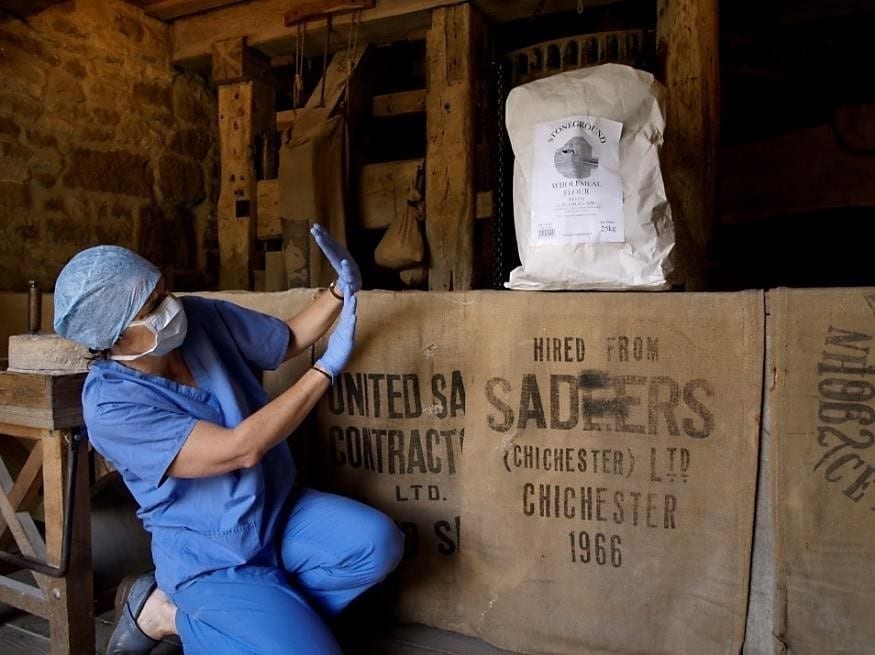Alice Ryrie
Manchester, United Kingdom
 |
|
Fig 1. Baptism (Purity), 2015 |
In our increasingly secular society, the value of health is rising. Moral values that used to be dominated by religion are now a matter of health: “in many ways the church has been replaced by the gymnasium.”1 Due to the rising pressure to be healthy, new problems have arisen about what to eat and how to eat. Health-food marketing uses a moral language suggesting that having a healthy body is a choice available to everyone, and the discourse of food and risk is associated with blame and judgement.2
Moral judgements about food are ubiquitous. The health-food industry and public health campaigners promote the idea that sugar is sinful, whilst eating a low-fat diet has cultural connotations of a more virtuous lifestyle. Food brands use these notions to market their products as healthy, utilizing words such as “pure,” “real,” or “innocent” on their packaging. Nonetheless, one could argue that these associations may encourage people to live a healthier lifestyle. Similarly, there is an argument to be made to discourage the consumption of unhealthy foods, especially with the rise of obesity and disease related to lifestyle. There are benefits to healthy eating and having more options for a healthier life. However, particular historical, political, and cultural factors—notably the health politics of the 1970s and developments in nutritional science—have also shaped the modern discourse of healthy eating, leading it to become misleading, exaggerated, and morally charged.
Consequently, the discourse of healthy eating may be doing more harm than good. For example, strict rules enforced by the weight-loss industry can induce feelings of guilt and shame, whereby trends such as “yo-yo dieting” can be more harmful to our physical health than being overweight.3 As well as the direct impact on physical health, mental and social wellbeing is at risk too. This is apparent in the rising anxiety about what we eat and how we eat.
Healthy eating, morality, and the wellness movement
 |
|
| Fig 2. The silent germ (Gluten-free), 2015 |
Whilst the preoccupation with health has recently expanded, the moral implications of healthy eating date back to antiquity. The Greek regime of dietetics was more than just a set of dietary rules; it was an entire “mode of living” providing a framework for behavior. For centuries, dietetics remained governed by beliefs through which moderation, self-control, and good behavior prevented disease.4 By the sixteenth century, eating in moderation was central to good health. The Art of Living Long by Italian Ambassador Luigi Cornaro advocated that strict dietary restriction was the secret to longevity, living himself to the age of 103.5
The recent focus on what we eat was largely influenced by nineteenth century health crusaders such as John H. Kellogg and Sylvester Graham, who promoted healthy eating as a moral, not just a physical pursuit.6 Graham preached that living a moderate lifestyle would prevent disease, and with public education about physiology, healthcare could become “self-reliant.”7 Historians Brandt and Rozin argue that even though an explicitly Christian moral framework had less authority in Western life at the end of the twentieth century, themes of control remained in the dietary discourse: low-fat, low sugar, and moderated portion sizes were only consumed by the morally righteous.8 These principles inform the wellness industry today. More than half of large companies in the US offer their staff wellness programs: healthy eating, exercise, smoking cessation, and mindfulness are provided to improve employees’ happiness and productivity.9
The ideology undermining the pursuit for health has been linked by several authors to the concept of “healthism.” The term, coined by American economist Robert Crawford in 1980, describes a political ideology established during the 1970s in which poor health and disease were seen as a result of individuals’ lifestyle choices.10 These ideas were consolidated by John Knowles, president of the Rockefeller Foundation in 1977, as he declared health an “individual moral obligation”: no longer a “right” but a “public duty.”11 Whilst this new responsibility saw people becoming more interested in preserving their health, it was also part of a larger preoccupation with the self. The Culture of Narcissism by cultural historian Christopher Lasch describes this as an obsession with “self-improvement,” offering a critical perspective on how US health politics of the 1970s inspired a culture embedded with “pathological narcissism.”12 However, this argument fails to recognize that health was not purely a pursuit of the individual: there were pressures to maintain health of the family too. This discourse is evident in the work of nutritionist Adelle Davis, whose books such as Let’s Eat Right to Keep Fit and Let’s Have Healthy Children were hugely influential during this era. Predominantly aimed at a female audience, this can be seen as confirmation of the “domestic anxieties” of the ’70s, by detailing the risks of poor health that might affect a family with an inadequate diet.13 The culture of blame and responsibility surrounding dietary choices contributes to the perception of healthy eating as a moral pursuit.
Good foods and bad foods: the role of nutritional science
 |
|
|
|
Fig 3. Fruit shop (Real), 2015. |
The fear of “bad” foods is now so pervasive that critical writer about nutrition Marie Nestle suggests the food industry will be “the tobacco industry of the new millennium.”14 Like tobacco, concerns about food arose from the connection of disease to risk factors. The 1960s saw a turning point in the history of food as certain foods were discovered to be linked to disease. The connection between saturated fat and cardiovascular disease, for example, induced such a widely known scare campaign that the idea of fat as categorically “bad” still persists today despite contrary evidence.15 The story of saturated fat epitomizes the late twentieth century approach to nutrition, which focuses on avoiding “bad” foods to reduce the risk of disease. However by the 1990s, foods considered to be “good” became more prevalent in the public eye, where “functional nutritionism” meant that health-enhancing foods were popularized by the food industry. Thus, the discourse of food was observed through a “nutritional gaze.”15
The division of foods into good and bad prevails over the health-food literature. Books such as Dr. David Servan-Schreiber’s Anticancer: a new way of life, use this concept to promote their dietary theories. He states that some foods act as “fertilizers for tumours,” whereas others “harbour precious anti-cancer molecules.”16 Servan-Screiber, a physician and cancer patient, fought for nutrition to play a greater role in cancer therapy. Whilst the benefits of improving nutrition are vital, this type of analysis reflects a wider discourse where foods are either demonized or glorified because of their relationship with risk. This is present within the culture of illness, where diseases such as cancer became viewed as a “price one pays for excesses of diet and life-style.”17 New trends such as clean eating have led to the propagation of specific diets (e.g. the gluten-free diet) that cut out foods perceived to inflict risk on the body. In this trend, foodstuffs such as gluten, dairy, meat, and refined sugars are avoided.
Sociological studies also demonstrate how these tensions about risk have entered the public sphere. For example, one study in the UK and Canada found that participants were aware of a “right” way to eat when asked about a healthy diet, whereas the indulgence of bad foods had to be justified, using statements such as “life is short.”18 Conversely, a dichotomy arises between self-control and pleasure. Whilst we are generally told to exercise self-control, we also have a “moral duty to have fun.” This is exploited by food marketing that tells us to “indulge” in unhealthy foods.19
The discourse surrounding health-foods reflects a wider preoccupation with health, stemming largely from political and cultural change in the 1970’s, which saw health move from a right to a personal responsibility. At the same time, the cultural, political and social roots of the discourse of healthy eating undermine the control we believe we have over what we eat.
Images
Fig. 1 Baptism (Purity), 2015.
The concept of purity has a longstanding and historical connection with food and morality; pure foods are not just seen as healthier, but morally better too. To reflect these religious connotations, I have staged my own baptism with coconut water, comparing it to holy water.
Fig. 2 The silent germ (Gluten-free), 2015.
The gluten-free diet is one of the leading food trends today. I explore the historical appreciation for gluten in juxtaposition with the modern disgust towards it, photographing a medical figure with one of the few remaining working watermills left in the UK, which was originally built to provide vital sustenance to the local area.
Fig. 3 Fruit shop (Real), 2015.
The real food movement has a vast following, deeming only natural food to be worthy. Here I photograph a box of fake fruits nestled amongst real ones in a fruit shop. As customers in the shop were unaware of the fake fruit, I question what it means to be “real,” and explore how the rejection of certain food is similar to society’s rejection of plastic.
Photographs by Alice Ryrie, private collection.
References
- Galvin R. Disturbing Notions of Chronic Illness and Individual Responsibility: towards a genealogy of morals. Health. 2002. 6(2).
- Lupton D. Lay discourses and beliefs related to food risks: an Australian perspective. Sociology of Health and Illness. 2005; 27(4):448-467.
- Metzl, J. M. and Kirkland, A. Against Health: How Health Became the New Morality. New York: New York University Press; 2010
- Coveney J. Foods, Morals and Meaning: The Pleasure and Anxiety of Eating. London: Routledge; 2006
- Cornaro L, Butler WF. The Art of Living. New York: Springer Publishing Company; 2005
- Conrad P. Wellness as virtue: morality and the pursuit of health. Culture, medicine and psychiatry. 1994;18(3); 385-401.
- Reiser S. Responsibility for personal health: a historical perspective. J Med Philos. 1985;10(1):7-17.
- Brandt AM, Rozin P. Morality and health. New York: Routledge; 1997
- CederströmC, SpicerA. The Wellness Syndrome. Cambridge: Polity Press; 2015.
- Crawford R. Healthism and the medicalization of everyday life. International Journal of Health Services. 1980;10(3):365-88.
- Knowles, J.H. The responsibility of the individual. Daedalus. 1997; 106(1):57–80.
- Lasch C. The Culture of Narcissism. New York: Norton and Company Ltd;1979.
- Lawrence SC. Let’s eat, Let’s Worry.J Hist Med Allied Sci. 2014;69(3):491-493.
- Nestle M. Food Politics: How the Food Industry Influences Nutrition and Health. London: University of California Press; 2013
- Scrinis, G. Nutritionism: The Science and Politics of Dietary Advice. New York, NY: Columbia University Press, 2013
- Servan-Schreiber D. Anti-cancer: a new way of life. London: Penguin Group; 2011
- Sontag S. Illness as Metaphor and AIDS and its metaphors. London: Penguin Books Ltd, 2002
- Spoel, P., Harris, R. and Henwood, F. The Moralization of Healthy Living: Burke’s Rhetoric of Rebirth and Older Adults’ Accounts of Healthy Eating. Health. 2012; 16, 619–635.
- Jallinoja P, Pajari P and Absetz P. Negotiated pleasures in health-seeking lifestyles of participants of a health promoting intervention. Health 2010; 14(2):115–130.
ALICE RYRIE, BMBS, MSc, graduated from Brighton and Sussex Medical School in 2017 and is currently working as a junior doctor in Manchester, UK. She has previously studied an MSc in Medical Humanities at the University of Manchester and has a keen interest in medical history and art.

Leave a Reply